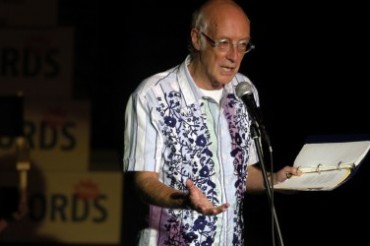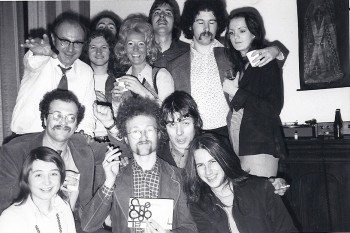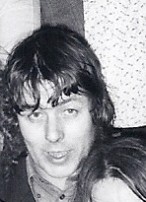Love Lane Lives
The history of sugar in Liverpool and the effects of the closure of the Tate & Lyle sugar refinery, Love Lane
Roger McGough was once a boy from the Whitestuff!
Written by Ron Noon at 20:32 on Sunday, June 28th 2009

Photo credit Peter Everard Smith
Roger McGough has been described in the Daily Post as “Liverpool’s own Poet Laureate”. He’s “a trickster you can trust” and after a serendipitous encounter with the honorary fellow of Liverpool John Moores University, in a closing down sale of mens clothes in a Church Street boutique, I found out that he also knows a good deal about life in a sugar factory! That’s the kind of insider knowledge that our web site craves.
Closing down sales can entrap the great and the good, and last Tuesday it lured the internationally acclaimed poet into a deal with a fellow bargain hunter that had nothing to do with sartorial elegance and everything to do with SUGAR! I did however exercise some compunction by deliberately avoiding early references to the white stuff and by introducing myself with a question about a mutual friend. “Excuse me pal”, I almost shouted out as the familiar stranger attempted to exit the store, “do ye remember Joe Martindale?” Of course he did.
Here’s a picture of a party in 23 Canning Street around June 1974 with Joe and various other “Poly people”“


Joseph Martindale was a wonderful human being as well as a witty and urbane Lecturer in Industrial Sociology at what was then called Liverpool Polytechnic. (Oh for the days of the gas and water municipal poly when we were young and less prone to follicle challenges and when John Moores the Football Pools magnate was precisely that and not an apt name for a venerable Higher Education institution.) Joe was a true Poly man, former monk and author of two fine late 1960s novels, Found Wanting and Dry Mass. He had been an important part of the Mersey beat and poetry scene and actually wrote a reference for McGough, when the swinging sixties were over and Roger became a Poetry Fellow at Loughborough University.
So strong is the memory and love of “St Helens Joe”, the garrulous storyteller who died of a heart attack in the early 1990s, that I talked to some friends about trying to resurrect his work and his name in our European Capital of Culture year. It’s an unfinished project but much more will be written about Joe because just like the many Love Lane lives we dedicate this website to, memories are everything. When they are so compellingly strong, the onus is on all historians, (our subject is too important to be left to just professional historians like myself), to record, document and encourage further commentary about these extraordinary ordinary lives.
Anyway that was the sad part of our boutique conversation but in a lighter more upbeat vein we progressed on to the white stuff and the final request I made to one of our best loved poets “from me to you mate” is “to join the Love Lane Lives Alumni”! My Latin exhortation for him to look at our website and make some comments is now recorded on this blog for posterity but my wife Gail thinks it a bit rude and intrusive. Why should he? The guy was only looking for a bargain not a lecture on Love Lane Lives from a sugar-centric University teacher! “But Gail I had a drink with Joe and the younger McGough in the Commerce bar sometime back in the 70s. I did get a round in although I have to admit that would n’t be the same kind of historical fact for Macca to remember because I’ve subsequently discovered he partied with Hendrix and Jane Fonda, not Ron Knee!”
The serendipitous exchange between the poet and the sugar bore came to an end when McGough’s poor wife, presumably fearing that she had lost him for good, returned to the shop to extricate the spouse from sweet talkin’ Ron.
So as I wait with baited breath to hear whether the Fellow from LJMU responds to this ordinary fellah’s request, here is the extant historical evidence of what the young poet was up to when he walked down the Lane in the mid 1950s.
My source is his 2005 autobiography Said and Done where there’s a humorous chapter on “Work experience” and reflections on life as a Hull University student.
“The long summer vacations were usually spent in Greece, either sailing between the islands or just simply lying on a beach sipping retsina and reading the latest Robbe-Grillet novel. No they weren’t”.
This proud son of a North end Liverpool docker, and a very rich culture of irony and “one liner merchants”, became a casual University student the year after the Stanley Matthews cup final in 1954. Fully cognisant that a Joint Honours degree in French and Geography required summers spent earning dosh with real WORK, he flitted from a toy factory where he helped make money boxes in “Dickensian squalor beneath the railway bridge”, to a bakery where he inadvertently “squashed loaves” that once demanded an emergency stop of the conveyor belt to stem “erupting floury lava”. Recovered from that trauma he moved on to the Char House in Tate & Lyle!
This Sugar factory made Henry Tate’s millions but the mother plant half a century after the patriarch’s death, witnessed an unwitting McGough induced eruption, and unintended version of industrial sabotage. It was probably this episode, documented below, which was the main reason why the young student decided he was better cut out to be a poet than a pansman like Bobby Austin.
“I don’t know what it is about me and machines, but we just don’t get on…Tate & Lyle had a huge factory on the Dock Road and employed an army of students during the summer vacations. One day I would be part of a gang humping bags of sugar on to the back of lorries and the next I would be stacking boxes in the stacking box shed. For a month I worked the night shift in the Char House, or Charcoal House, a Victorian building on three floors where raw sugar was filtered through charcoal as part of the cleansing process. I enjoyed working through the night, and I liked the company of the men I worked with. The constant breaks for tea and toast and roll-ups in the furnace room with a group of surreal Scouse philosophers, who shared with the dockers an aptitude for bestowing colourful names on their colleagues – the Balloon foreman: ‘Don’t let me down lads’; the Sheriff foreman: Where’s the holdup?; ‘Lino’: ‘He’s always on the floor’; ‘Phil the Cot: ‘He’s got fourteen kids’.
Instead of loaves, it was charcoal dust that did for me this time when the chargehand left me on my own at 2am on the third floor. The huge space with its tiled walls and clanking metal pipes was like the engine room on some abandoned liner: ‘All you’ve gorra do is stand by the big pipe here, and when the noise changes hit that button there.’
‘What about these dials?’ I asked, pointing to a handful of quivering fingers.
‘Take no notice. See yer lad.’
So I pulled up a chair and sat down in front of what looked like a small ship’s funnel and waited for the noise to change. What noise? I could n’t hear anything. Oh, yes I could. Did he mean that faint sifting noise, like the sound of icing sugar passing gently through a sieve? Or did he mean the ticking noise coming from one of those dials? No, he’d told me to forget about the dials. Could he have meant the scuffling noise coming from the far corner? No, that’s a rat, take no notice. It’s amazing the sounds you can hear when you are cast adrift in an ocean liner above the rooftops of a sleeping city. Foghorns, of course, out on the river. A baby crying in a tenement block? Two lovers giggling in Paradise Street? In the empty jazz cellar, the pianist plays a final blues. Eyes closed now, I feel myself drifting into a sweet aural reverie. Drifting…Drifting…
Suddenly, what’s that noise? Snoring? The sound of somebody snoring? When I realised that I’d been asleep but not snoring, it was time to panic. The noise, and it was increasingly deafening, was coming from the blasted funnel and it was time for me to spring into action as I’d been trained to do. I hit the button. The trouble is that five minutes is a long time for charcoal to be pumped along lengths of piping and the eruption, though lacking the glorious yeasty smell of the bakery volcano, was a good deal more volatile and disruptive. Black clouds billowed around the room and the charcoal dust settled to a depth of several feet. It was like a satanic snowstorm. My Al Johnson impersonation failed to impress the chargehand when he arrived but at least he helped me shovel out the dust and hose down the room. The next day the good soldier was transferred to humping bags of sugar on to the backs of lorries.”
Roger McGough Said and Done the autobiography
Published by Century in 2005
....................
I tell my students about Hindsight Station and how much easier it is to look back down the tracks and see how we got to where we are now. The detours and branch lines can only be viewed in retrospect and from my place on the platform I see a wonderful cultural opportunity missed! The Times described Mr McGough’s Mersey Makeover of 17th century French satirist Moliere, now playing at the excellent Liverpool Everyman, as a “witty laughter tonic” and the Observer, not to be outdone, said it was “anarchic, irreverent, and hysterically funny”! That’s what Roger’s account of working at Tate & Lyle’s suggests and as you’ve read above, it was their char house that helped finance his French studies at Hull University.
The Hypochondriac by Roger McGough after Molière, the Everyman Playhouse, Liverpool, June 19 to July 11 (0151-709 4776; everymanplayhouse.com).
It’s sponsored by Liverpool John Moores University where Roger’s a FELLOW and I’m a fellah!
